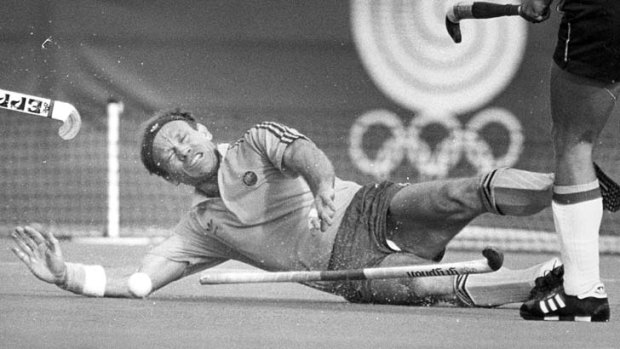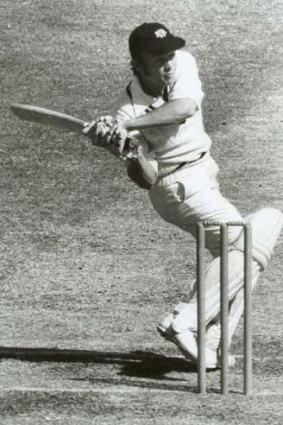By Daniel Lane
Who do you think is Australia's greatest coach? Let us know in the comments
Australians love their sports coaches to be tough like Clint Eastwood, rough around the edges like a diamond and to possess the rare qualities that inspire athletes to run onto the field and push through pain and occasionally fear to achieve victories and records that will bring a packed stadium to its feet in a united roar that will remain in the collective imagination for generations.

Coach with the most: Ric Charlesworth is leaving after guiding the Kookaburras to World Cup triumph.Credit: Stefan Gosatti
And there are a million anecdotes, true and apocryphal, that suggest there is a fine line between genius coach and crackpot.
Swim coach Laurie Lawrence was said to have grown so tired at hearing a member of his squad boast about his toughness that he grabbed him, stood him face-first in front of a brick wall, took his own fist and growled through gritted teeth: "You wanna see tough? Take a look!" before proceeding to scrape his knuckles along the rough brickwork until they bled.

Down but not out in 1988 at Seoul as captain of our hockey side.Credit: Paul Mathews
Wallabies coach Dave Brockhoff was said to have stunned his players before a 70s test against the All Blacks when, after delivering a stirring speech he turned on his heel and slammed the dressing room door shut so violently that it was ripped from its hinges and crashed to the floor.
The mood changed dramatically – from deathly silence to unbridled laughter – when a member of the support staff revealed Brockhoff had arrived hours before them, screwdriver in hand, to ensure the aftermath of his speech made a dramatic impact.
Rugby league's master coach Jack Gibson ordered the visiting team's dressing room at Cronulla's Shark Park – walls and all – to be painted a pastel pink after he heard the colour was popular in psychiatric wards because it had a calming effect on the patients. He thought it'd give his team an advantage.
Of course, it's not all smoke and mirrors. Dr Ric Charlesworth will complete his tenure as the men's national hockey team's coach next month. Over the past 20 years as mentor to both the men's and women's teams Charlesworth's players have enjoyed repeated success at every major tournament: the Olympics, World Cup, Champions Trophy and the Commonwealth Games.

Charlesworth also played 47 first-class cricket matches for Western Australia.
In between these outstanding international successes he found time to serve as Cricket New Zealand's High Performance Manager, was seriously considered to coach the Australian cricket team and worked as a consultant with the Fremantle Dockers AFL team.
Charlesworth will now sign off after guiding the Kookaburras to World Cup triumph in the Netherlands last weekend.
Whether hockey – a high profile sport in Europe and on the subcontinent but dismissed as "minor" in Australia – could boast the nation's greatest-ever coach is contentious. However, it's an argument Senator Nova Peris, who won an Olympic gold medal under Charlesworth in 1996 before she switched to running and won the Commonwealth Games gold medal for the 200m event two-years later, is happy to take on.
"By far, I think he's the greatest sporting coach/individual athlete ever," Peris says. "When you look at the great coaches of Australian sport: Wayne Bennett in rugby league and Kevin Sheedy in AFL; league is an international sport [played in a small number of countries] while AFL is confined to Australia.
"Hockey is an international game and for him to go to five Olympics as a player – even though [Moscow] was boycotted – is a huge achievement in itself.
"Prior to that he played first-class cricket for Western Australia. He went to university and studied to become a doctor. He was a politician. He had three young kids when he coached us and they've grown to become doctors and elite sports people, As a coach he took sport to a new level."
Like saints in the church, Australian sport's greatest coaches are defended by zealots who champion their legend. The mere suggestion that one individual is the "greatest ever" is a sure-fire way to start a fight.
Sports historian Geoff Armstrong and sporting consultant Wayne Goldsmith say while they are in awe of Charlesworth's feats they are reluctant to bestow "greatest" ahead of the likes of Jock McHale, Norm Smith, Kevin Sheedy, Wayne Bennett, Jack Gibson, Harry Hopman, Norma Plummer, Percy Cerutty, Bob Simpson, Don Talbot, Bill Sweetenham and a long list of others.
It's a debate Charlesworth himself does not want to entertain. As he put the finishing touches on the Australian hockey squad that will compete at next month's Commonwealth Games, Charlesworth says while well aware of his contemporaries, he has never bothered much about the question of who is the greatest.
"I don't think about it," he says. "We have a focus on domestic sport in Australia and team sports and individual sports are different. Percy Cerutty [who coached Herb Elliott] had ground-breaking ideas and you had Harry Hopman in tennis, but I don't know if we have that many examples of coaching teams internationally.
"Perhaps our most effective have been our hockey teams. Cricket is slowly, slowly starting to get there. Until recent times our top players were saying coaches were incidental. I think John Buchanan played a significant role in changing that, but cricket is the Commonwealth Games ... We don't play the US, Germany or Russia in cricket and rugby is the same.
"But I listen to, and I watch, other coaches. Wayne Bennett has been an enduring, quality coach for decades and they're the sorts of things that tell a story. David Parkin and Kevin Sheedy were successful in AFL over a period of time because of the quality of their message and how they went about it. I think Alastair Clarkson has done a terrific job at Hawthorn and the coaches at Geelong have been great."
Sheedy needs no time to express his thoughts when the words "Charlesworth" and "greatness" are put to him.
"Wow, now there's a coach," he enthuses. "He's in the absolute top echelon of coaches and he's to be heard and listened to in every corner of coaching because he's put a lot of thought and balance into what should, or needs, to be done to improve the sport or to win at the top level.
"He challenges everything and he normally gets it right. He can be confrontational but he puts thought into it. He's demanding but that's good because it means he thinks what he wants to go after is worthwhile."
Former rugby league coach and respected Fairfax columnist Roy Maters says Charlesworth's willingness to play his athletes out of their comfort zone is not only revolutionary but provides his teams with a greater appreciation for the skills each player brings to the squad.
"He was the first coach who really forced players to have an appreciation for what it's like to play in different positions," he says. "I remember covering Olympic Games when he coached the women and he'd have goalies play in the field or wingers in the forwards to provide them with an appreciation for the other spots."
Charlesworth says his life as an international hockey player, his 10 years in federal government – which is noted by his being the first politician to raise the matter of HIV in parliament and for seconding the call to ban smoking on aeroplanes – and playing almost 50 matches for Western Australia's cricket team alongside the likes of Dennis Lillee and Rod Marsh helped to prepare him for his career as a coach.
However, he says it was as a doctor that he discovered the teamwork that's required in an operating theatre, where everyone from the surgeon to nurse needs to know their roles, that was the blueprint he followed.
"I spent a decade in medicine," he says. "I didn't learn a lot about teamwork in my parliamentary time but I did in medicine.
"If you're in an operating theatre and you were awake – and most of us aren't – you'd see a range of people work co-operatively together to get the outcome right. In the hospital ward there's a whole range of people working together to hopefully get the right treatment in place.
"My experience in parliament was you had to get on your feet and speak and that's a terrific training. All of those things informed my experience as a coach."
Charlesworth reveals his decision to step down so close to the Commonwealth Games is in tune with his philosophy of putting the team first.
"One of the reasons why I felt the need to step down was because [coaching] is draining," he says of the intensity. "Living it day to day, you get washed out. I need a break.
"I thought it'd be self indulgent to go after the Commonwealth Games. Selection for the World Cup was the toughest ever and that's a credit to the depth of our program. For the Commonwealth Games we have a younger group who are ripe and ready and it's appropriate for me to step aside.
"My timing is about me and my energy and also the group."
The true mark of a great coach is the impact they have on their athletes. Charlesworth acknowledged while some will remember him as a mentor others may recall a tormentor. Peris stood in Parliament this week and described him as a guiding light.
"I only had five minutes [to speak] and after mentioning the success of the mens' and womens' teams in the world cup I paid my respects to Ric because I attribute my success in hockey, athletics and my political life to how he mentored me during that six year period I spent with him as a hockey coach.